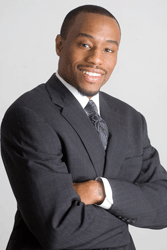Digging for Diamonds in Our Back Yard
Marc Lamont Hill urges TC's entering class to view young people as a living text
By Joe Levine
At a moment when education is seen as “an elixir” for everything from mass unemployment to mass incarcerations “so much is on educators to make the world a better place,” Marc Lamont Hill told TC’s Fall 2011 entering class.
But in a rousing in a keynote address at TC’s new student orientation, Hill, Professor of English Education and a leading expert on hip-hop culture, argued that the United States is failing to realize Horace Mann’s vision of education as “the great equalizer.”
To illustrate his point, he said that on a recent visit to Westinghouse High School in Brooklyn, he had learned that four major rap stars – JZ, Biggie Smalls, L’il Kim and Busta Rhymes – had all been students there. Yet no one, from the principal to the school nurse, could remember any of them.
“It was funny, but on another level, depressing,” Hill said. “Here were four people with the ability to change our consciousness and affect the world. So what does it mean that our best and brightest could navigate this school unnoticed, and succeed not because of school but in spite of it?”
Hill challenged his audience to not only meet students on their own cultural turf, but to shift the conversation away from a focus on students’ deficits to instead exploring what’s wrong with our culture and our schools.
“There are diamonds in our own back yard if we start digging – which begins for all of you today,” he said. “Your job is to complicate and enrich our view of education and our view of who these young people are. We need to view the world as a classroom and young people as a living, breathing text.”
He reminded the TC students that while they may be young, they are still the product of a vastly different time than today’s teenagers.
“You had access to the Internet, but a kid born in1996 does not know a world without it – without Google, Wikipedia, Facebook, text messaging. The world moves differently for these young people, the space compression is different – the world is at once smaller and bigger for them,” Hill said. “Our job is to understand the moment in which these young people are produced.”
He urged the aspiring teachers in the audience to make their students media-literate about the world they’re facing, “whether about pledging allegiance, or TV with two minutes of news and 13 minutes of ads, or a history book in which they never see a gay or lesbian person or a person in a wheelchair make a contribution of value.”
He closed by describing how, while working at a school in Philadelphia, he had proposed teaching an English course exclusively centered on the lyrics of rap songs. Initially, he was allowed to teach the course only with students whose performance had been so bad that they were consigned to night school. Yet the results with those students were so striking – “we were able to do all sorts of literary pedagogy and also talk about suicide and despair, and attendance and achievement went up” – that the principal put some of the students back in mainstream classes in order to bolster the school’s performance on standardized tests.
“If we pause and investigate deeply, we can understand these youth in such ways that we can reimagine school and create new frameworks, new bodies of literature, new methodologies, and a new canon,” Hill said. “And you’re the generation that’s going to do it.”
Published Friday, Oct. 7, 2011
